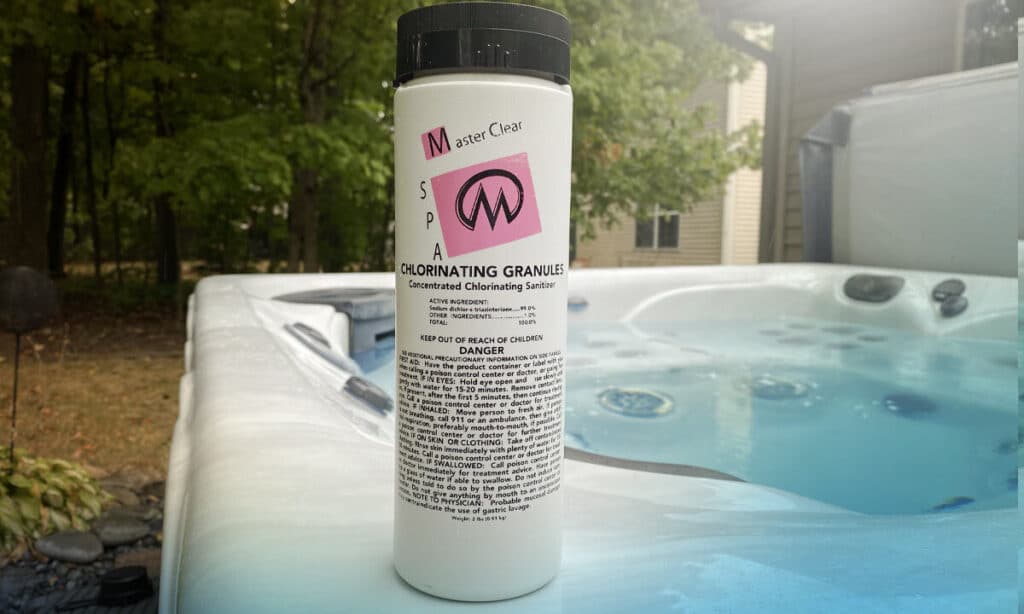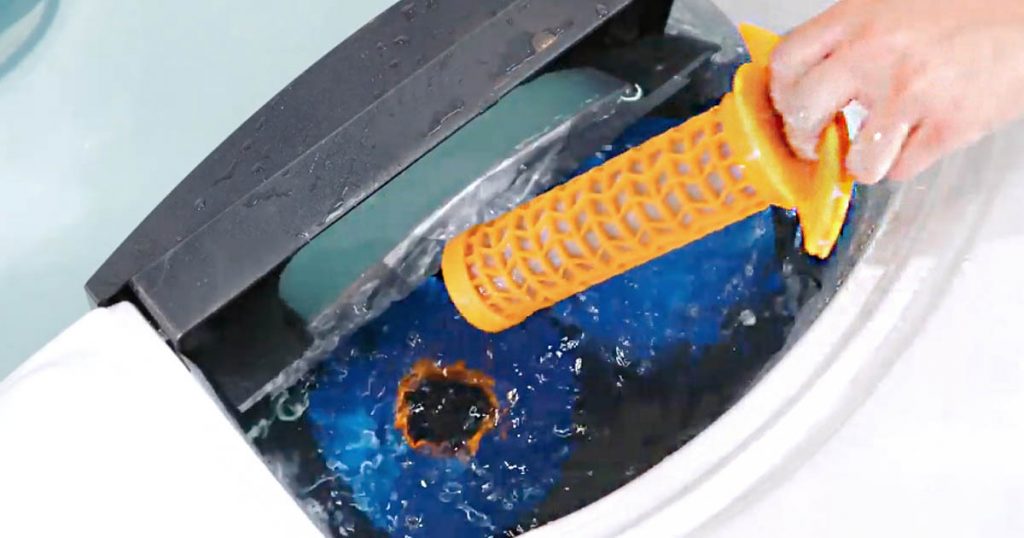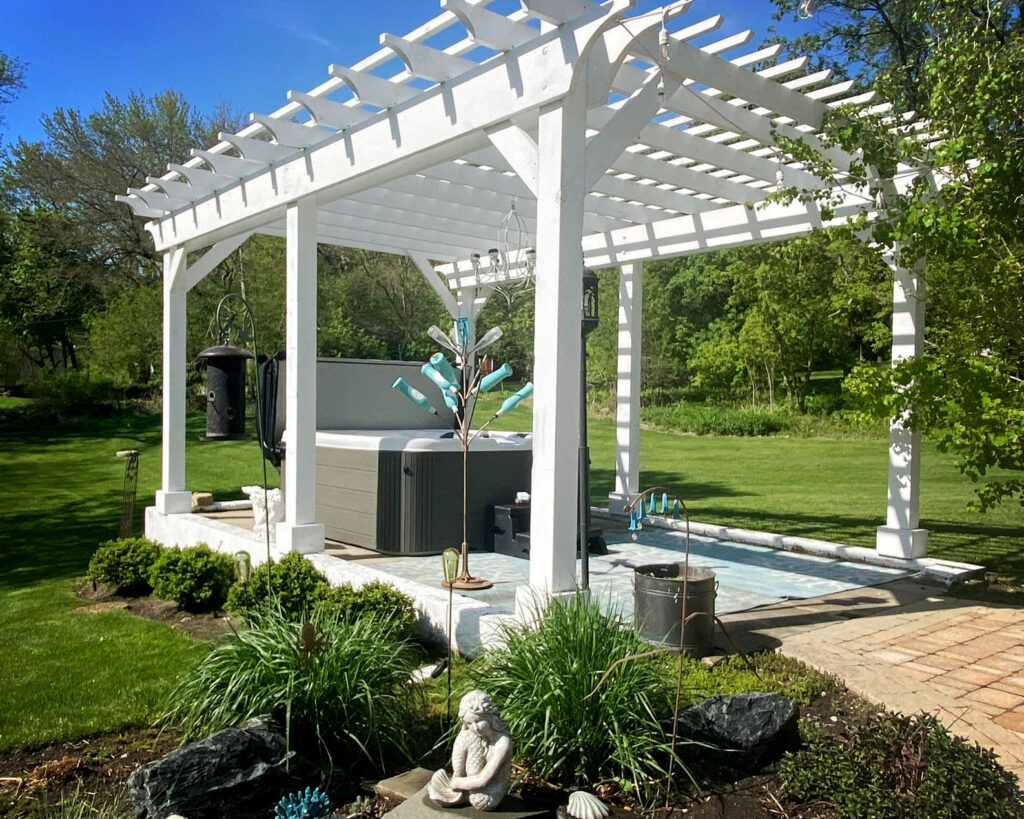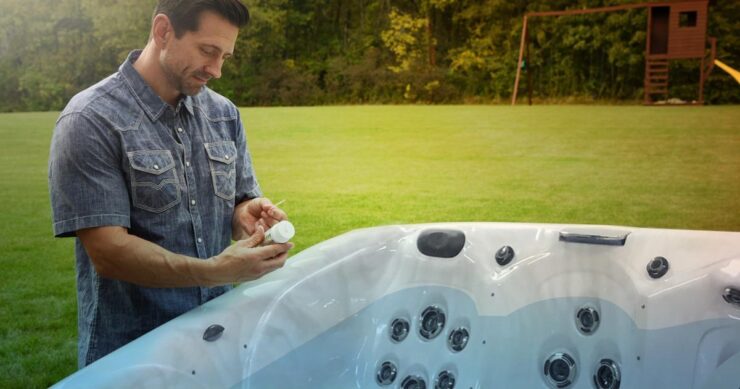Hot tubs are designed for relaxation and to elevate your overall well-being. However, it can be hard to unwind when you are feeling stressed about keeping the water clean. Picture this: You’ve had a long day, and all you want to do is get into the hot tub and turn on the jets. But as you open up the cover, you notice the water looks a bit cloudy.
That’s where sanitizer comes in. A hot tub sanitizer, such as chlorine, helps rid your water of bacteria, algae, and other unwanted organisms. Working alongside other hot tub chemicals, sanitizer also helps keep your water clean and maintain the clarity.
But hot tub owners have options, though, when choosing a hot tub sanitizer. The most popular choices are — chlorine, bromine, salt, and minerals. While homeowners should consider effectiveness and ease of use, the best sanitizer will work alongside the hot tub’s filtration system to provide a safe and enjoyable spa experience.

Basics of hot tub sanitizers
Maintaining hot tub water is all about balance. You need to have your total alkalinity, pH, and sanitizer levels in the right range so that you can relax and soak safely.
Sanitizer, specifically, kills bacteria and other organic material and ensures the water quality. The CDC recommends hot tub owners maintain adequate chlorine or bromine levels in a hot tub. However, hot tub owners have additional options including salt and minerals.
But before you choose the best sanitizer for your hot tub, you have to understand how each works.
Chlorine
Chlorine is perhaps the most widely used sanitizer for hot tubs and swimming pools. It is cost-effective, readily available, and effectively kills bacteria and other microorganisms. Chlorine can be used in various forms, including tablets, granules, or liquid.
When it comes to hot tub water, though, most manufacturers recommend using dichlor granules. This type of chlorine dissolves quickly, allowing it to be evenly distributed throughout the water. In addition, it is pH neutral, has a built-in stabilizer, and has a long shelf life.
For clean, balanced water, your free chlorine should be between 1 to 3 parts per million. On initial start-up, you might want to add enough chlorine so that the levels are between 5 to 8 ppm.
Bromine
Bromine is an alternative sanitizer to chlorine, and it is sometimes chosen for hot tubs because it is stable at higher temperatures and in sunlight. Working similarly to chlorine, bromine can kill bacteria and other contaminants.
However, there are distinct differences between bromine and chlorine. Bromine is slower to dissolve and activate in the water. In addition, if you are using bromine, you will need to keep the pH at a higher level to make sure that the sanitizer can be effective. Owners might find that they are spending more time — and money — trying to keep the pH in the range that allows bromine to be effective.
Another downside of bromine? It can damage the hot tub components and surface.
Bromine is available in tablet or granular form and requires routine testing and adjusting to maintain appropriate levels (3-5 ppm).
Salt systems for hot tubs
Saltwater sanitation systems have become a popular choice for hot tub owners. They offer an enjoyable, low-maintenance experience while providing water that feels softer and more natural.
So how does it work? In a saltwater system, you add spa salt to your hot tub, and through a process called electrolysis, that salt is converted into chlorine. Yes, there’s still chlorine in the water, but a salt system produces it in a smoother, more controlled way.
One of the biggest advantages of a smart salt system is its ability to adjust based on how often you use your hot tub. While you might need to add a little chlorine granules or an oxidizer after heavy use, this is minimal compared to traditional water care. Plus, with newer smart systems, you can manage it all from the a smart phone app — making it nearly a “set it and forget it” experience.
Of course, regular water care is still part of owning a hot tub. You can use test strips to easily check alkalinity, pH, and calcium levels.
Mineral filtration
Natural springs and pools are renowned for their crystalline waters. But Mother Nature isn’t out there adding chemicals to a stream or lake to make sure it’s safe. Rather, a combination of physical, biological, and chemical processes such as ozone and oxygen work together to purify natural waters.
Similarly, mineral filtration systems use natural elements such as copper and zinc to purify hot tub water. These minerals help inhibit the growth of bacteria and algae, reducing the need for chemical sanitizers.
Mineral filtration is often used in conjunction with chlorine to enhance their effectiveness and reduce the overall chemical usage. This method provides a more natural and environmentally friendly approach to sanitizing hot tub water.

Benefits of mineral filtration systems for hot tubs
As hot tub owners look for the best way to keep hot tub water clean, many want to reduce their dependence on chemicals.
But chemicals are necessary to keep hot water clean and safe. Chemicals disinfect the water, maintain water clarity, and protect the well-being of those using the spa.
Mineral filtration systems, such as Master Spas’ EcoPur system, allows you to easily maintain a hot tub with fewer chemicals compared to other ways of sanitizing the water. Plus, it allows you to extend the life of your equipment, make maintenance easier, and enhance the overall ownership experience.
Natural purification
One of the primary benefits of a hot tub mineral filtration system is its ability to reduce reliance on chemicals. Master Spas owners will still add chlorine, which works alongside the minerals in the EcoPur system to keep the water clean. However, the amount of chlorine needed is lower compared to other systems.This reduction in chemical usage leads to softer, gentler water that is more comfortable for soaking.
Gentle on the skin and eyes
Mineral filtration systems provide a more natural and gentle approach to sanitizing hot tub water. The combination of minerals not only helps to kill bacteria and algae but also produces water that feels softer on the skin. This gentler water chemistry can alleviate common issues like dryness or irritation, allowing you to relax and unwind without discomfort.
Extend the lifespan of your spa
One of the questions that customers ask is “How long does a hot tub last?” A quality hot tub, such as Master Spas, can last decades — especially with proper maintenance.
It might be surprising to discover that the water care system can contribute to the longevity of a hot tub.
Mineral filtration systems such as EcoPur reduce the need for other sanitizers, helping to prevent damage to the plumbing. Bonus: With less damage to equipment, mineral systems can help save owners time and money because there’s less maintenance and need to replace components.
Easier maintenance
Maintaining a hot tub mineral filtration system is relatively straightforward. Master Spas owners can expect to test the water a few times a week and balance the water as necessary. Still, many hot tub owners find that the EcoPur system requires less work compared to other filtration systems.
Master Spas owners can expect to rinse the mineral cartridge once a month, and it should last about six months. Regularly replacing the cartridge will help owners enjoy consistently clean and clear water with minimal effort.

Buy an all-season hot tub
Are you ready to invest in your well-being and backyard? Master Spas hot tubs can be enjoyed this year and many years to come. You can click here to learn more about the benefits of hydrotherapy. Or, contact your local Master Spas retailer to learn more about hot tub ownership. Wondering how much a Master Spas hot tub costs? You can request a quote here.


